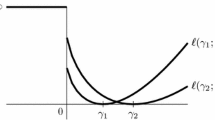Abstract
We develop a methodology for studying “large deviations type” questions. Our approach does not require that the large deviations principle holds, and is thus applicable to a large class of systems. We study a system of queues with exponential servers, which share an arrival stream. Arrivals are routed to the (weighted) shortest queue. It is not known whether the large deviations principle holds for this system. Using the tools developed here we derive large deviations type estimates for the most likely behavior, the most likely path to overflow and the probability of overflow. The analysis applies to any finite number of queues. We show via a counterexample that this system may exhibit unexpected behavior
Similar content being viewed by others
References
Atar R, Dupuis P (1999) Large deviations and queueing networks: methods for rate identification. Stoch Proc Appl 84:255–296
Bertsimas D, Paschalides L, Tsitsiklis JN (1999) Large deviations analysis of the generalized processer sharing policy. Queueing Syst 32:319–349
Chang C-S (1995) Sample path large deviations and intree networks. Queueing Syst 20:7–36
Dembo A, Zeitouni O (1996) Large deviations techniques and applications, 2nd edn. Springer, Berlin Heidelberg New York
Dupuis P, Ellis RE (1995a) The large deviations principle for a general class of queueing systems I. Trans Am Math Soc 347:2689–2751
Dupuis P, Ellis RE (1995b) A weak convergence approach to the theory of large deviations. Wiley, New York
Foley RD, McDonald D (2001) Join the shortest queue: stability and exact asymptotics. Ann Appl Prob 11:569–607
Ganesh AJ, O’Connell N (2002) A large deviation principle with queueing applications. Stoch Stoch Rep 73:25–35
Ganesh AJ, O’Connell N, Wischik D (2004) Big queues. Springer, Berlin Heidelberg New York
Ignatiouk-Robert I (2005) Large deviations for processes with discontinuous statistics. Ann Prob (to appear)
Mandjes M (1999) Rare event analysis of the state frequencies of a large number of markov chains. Stoch Models 15:577–592
Mandjes M, Ridder A (1999) Optimal trajectory in a queue fed by a large number of sources. Queueing Syst 31:137–170
Mandjes M, Weiss A (2003) Sample path large deviations of a multiple time-scale queueing model (preprint)
McDonald D (1996) Overloading parallel servers when arrivals join the shorest queue. In: Glasserman P, Sigman K, Yao D (eds) Stochastic networks: stability and rare events. Springer, Berlin Heidelberg New York, pp 169–196
Puhalskii AA, Whitt W (1998) Functional large deviation principles for waiting and departure processes. Prob Eng Info Sci 12:479–507
Ridder A, Shwartz A (2005) Large deviations methods and the join-the-shortest-queue model. Report, available (JSQreport) from http://www.ee.technion.ac.il/~adam/PAPERS
Shwartz A, Weiss A (1995) Large deviations for performance analysis: queues, communication and computing. Chapman Hall, London
Shwartz A, Weiss A (1999) Multiple time scales in Markovian ATM models I. Formal calculations. In: CC PUB 267. Electrical Engineering, Technion
Shwartz A, Weiss A (2005) Large Deviations with diminishing rates. Math Oper Res (to appear)
Stolyar AL (2003) Control of end-to-end delay tails in a multiclass network: LWDF discipline optimality. Ann Appl Prob 13:1151–1206
Stolyar AL, Ramanan K (2001) Largest weighted delay first scheduling: large deviations and optimality. Ann Appl Prob 11:1–48
Turner S (2000) Large deviations for join the shorter queue. In: McDonald D, Turner S (eds) Analysis of communication networks: call centres, traffic and performance. The Fields Institute, Toronto
Wischik DJ (2001) Sample path large deviations for queues with many inputs. Ann Appl Prob 11:379–404
Weiss A (1986) A new technique for analyzing large traffic systems. Adv Appl Prob 18:506–532
Author information
Authors and Affiliations
Corresponding author
Additional information
Work of the first author was performed in part while visiting the Technion. Work of the second author was performed in part while visiting the Vrije Universiteit, Amsterdam, and was supported in part by Fund for the promotion of research at the Technion.
Rights and permissions
About this article
Cite this article
Ridder, A., Shwartz, A. Large deviations without principle: join the shortest queue. Math Meth Oper Res 62, 467–483 (2005). https://doi.org/10.1007/s00186-005-0037-1
Received:
Accepted:
Published:
Issue Date:
DOI: https://doi.org/10.1007/s00186-005-0037-1



